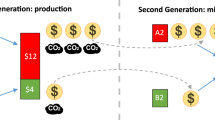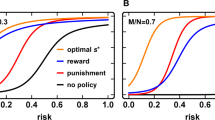Abstract
Two decades of international negotiations show that agreeing on emission levels for climate change mitigation is a hard challenge. However, if early warning signals were to show an upcoming tipping point with catastrophic damage1,2,3,4,5,6,7, theory and experiments suggest this could simplify collective action to reduce greenhouse gas emissions8,9,10,11. At the actual threshold, no country would have a free-ride incentive to increase emissions over the tipping point, but it remains for countries to negotiate their emission levels to reach these agreements. We model agents bargaining for emission levels using strategic reasoning12,13 to predict emission bids by others and ask how this affects the possibility of reaching agreements that avoid catastrophic damage. It is known that policy elites often use a higher degree of strategic reasoning13,14, and in our model this increases the risk for climate catastrophe. Moreover, some forms of higher strategic reasoning make agreements to reduce greenhouse gases unstable. We use empirically informed levels of strategic reasoning when simulating the model.
This is a preview of subscription content, access via your institution
Access options
Subscribe to this journal
Receive 12 print issues and online access
$209.00 per year
only $17.42 per issue
Buy this article
- Purchase on Springer Link
- Instant access to full article PDF
Prices may be subject to local taxes which are calculated during checkout


Similar content being viewed by others
References
Alley, R. B. et al. Abrupt climate change. Science 299, 2005–2010 (2003).
Lenton, T. M. et al. Tipping elements in the Earth’s climate system. Proc. Natl Acad. Sci. USA 105, 1786–1793 (2008).
Scheffer, M. et al. Early-warning signals for critical transitions. Nature 461, 53–59 (2009).
Lenton, T. M. Early warning of climate tipping points. Nature Clim. Change 1, 201–209 (2011).
Barnosky, A. D. et al. Approaching a state shift in Earth’s biosphere. Nature 486, 52–58 (2012).
Scheffer, M. et al. Anticipating critical transitions. Science 338, 344–348 (2012).
Lenton, T., Livina, V., Dakos, V., Van Nes, E. & Scheffer, M. Early warning of climate tipping points from critical slowing down: Comparing methods to improve robustness. Phil. Trans. R. Soc. A 370, 1185–1204 (2012).
Barrett, S. & Dannenberg, A. Sensitivity of collective action to uncertainty about climate tipping points. Nature Clim. Change 4, 36–39 (2014).
Smead, R., Sandler, R. L., Forber, P. & Basl, J. A bargaining game analysis of international climate negotiations. Nature Clim. Change 4, 442–445 (2014).
Barrett, S. Climate treaties and approaching catastrophes. J. Environ. Econ. Manage. 66, 235–250 (2013).
Barrett, S. & Dannenberg, A. Climate negotiations under scientific uncertainty. Proc. Natl Acad. Sci. USA 109, 17372–17376 (2012).
Crawford, V. P., Costa-Gomes, M. A. & Iriberri, N. Structural models of nonequilibrium strategic thinking: Theory, evidence, and applications. J. Econ. Lit. 51, 5–62 (2013).
Hafner-Burton, E. M., LeVeck, B. L., Victor, D. G. & Fowler, J. H. Decision maker preferences for international legal cooperation. Int. Org. 68, 845–876 (2014).
Hafner-Burton, E. M., Hughes, D. A. & Victor, D. G. The cognitive revolution and the political psychology of elite decision making. Perspect. Polit. 11, 368–386 (2013).
Stein, A. A. Coordination and collaboration: Regimes in an anarchic world. Int. Org. 36, 299–324 (1982).
Vasconcelos, V. V., Santos, F. C., Pacheco, J. M. & Levin, S. A. Climate policies under wealth inequality. Proc. Natl Acad. Sci. USA 111, 2212–2216 (2014).
Weikard, H.-P. & Dellink, R. Sticks and carrots for the design of international climate agreements with renegotiations. Ann. Oper. Res. 220, 49–68 (2014).
Barrett, S. The theory of international environmental agreements. Handbook Environ. Econ. 3, 1457–1516 (2005).
Fudenberg, D. & Levine, D. Learning in games. Eur. Econ. Rev. 42, 631–639 (1998).
Young, H. P. Strategic Learning and its Limits (Oxford Univ. Press, 2004).
Milinski, M., Sommerfeld, R. D., Krambeck, H.-J., Reed, F. A. & Marotzke, J. The collective-risk social dilemma and the prevention of simulated dangerous climate change. Proc. Natl Acad. Sci. USA 105, 2291–2294 (2008).
Kjellén, B. A New Diplomacy for Sustainable Development: The Challenge of Global Change (Routledge, 2014).
Victor, D. G. Copenhagen II or something new. Nature Clim. Change 4, 853–855 (2014).
Samuelson, L. Evolutionary Games and Equilibrium Selection Vol. 1 (MIT Press, 1998).
Nagel, R. Unraveling in guessing games: An experimental study. Am. Econ. Rev. 85, 1313–1326 (1995).
Stahl, D. O. Boundedly rational rule learning in a guessing game. Games Econ. Behav. 16, 303–330 (1996).
Duffy, J. & Nagel, R. On the robustness of behaviour in experimental ‘beauty contest’ games. Econ. J. 107, 1684–1700 (1997).
Shapiro, D., Shi, X. & Zillante, A. Level-k reasoning in a generalized beauty contest. Games Econ. Behav. 86, 308–329 (2014).
Gardner, E. S. Exponential smoothing: The state of the art–part II. Int. J. Forecast. 22, 637–666 (2006).
Bostrom, N. & Cirkovic, M. M. Global Catastrophic Risks (Oxford Univ. Press, 2008).
Acknowledgements
V.V., D.J.A.J. and K.L. want to thank the Swedish Energy Agency and the EU-FP7 project Mathemacs for financial support. We thank R. Smead, R.L. Sandler, P. Forber and J. Basl for providing detailed information about their Figure 1 starting values to facilitate comparison.
Author information
Authors and Affiliations
Contributions
V.V. designed, performed the research and wrote the paper with contributions from D.J.A.J. and K.L.
Corresponding author
Ethics declarations
Competing interests
The authors declare no competing financial interests.
Supplementary information
Rights and permissions
About this article
Cite this article
Verendel, V., Johansson, D. & Lindgren, K. Strategic reasoning and bargaining in catastrophic climate change games. Nature Clim Change 6, 265–268 (2016). https://doi.org/10.1038/nclimate2849
Received:
Accepted:
Published:
Issue Date:
DOI: https://doi.org/10.1038/nclimate2849



